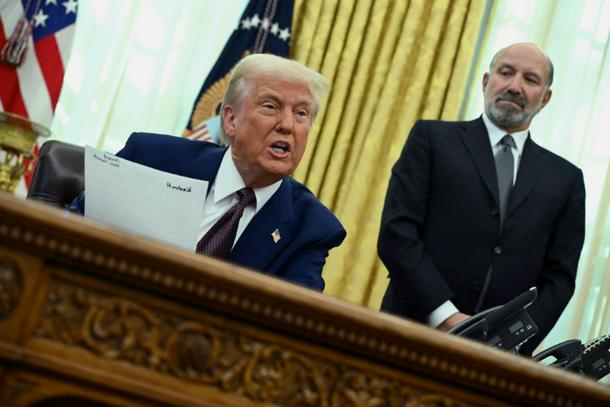
US President Donald Trump announces reciprocal tariffs from the White House Oval Office on February 13, 2025 as Howard Lutnick looks on
Washington (AFP) - The US Senate voted Tuesday to confirm Wall Street billionaire Howard Lutnick as commerce secretary, a key step towards the rollout of President Donald Trump’s “America First” trade agenda, which uses tariffs as a broad negotiation tool.
Trump has threatened sweeping levies on US allies and competitors alike, looking to tariffs not only as a way to raise revenue but also pressure other countries to act on US priorities.
Lutnick, who was chief executive of financial services firm Cantor Fitzgerald, is a close ally of Trump’s and has been a defender of imposing tariffs on US imports.
On Tuesday, he was confirmed by a vote of 51-45. A spokesman for Lutnick told AFP that he has stepped down from Cantor.
He takes the helm at a department that advocates for US business interests and oversees an apparatus restricting the export of certain technology – including semiconductors – to adversaries, including China and Russia.
The role will place him at the frontier of Washington’s tariff and trade agenda too, working with the US Trade Representative’s office.
The Commerce Department is in charge of a nearly $53 billion program involving subsidies to stimulate the US chipmaking sector, which Lutnick earlier called an “excellent downpayment” despite stressing the need to review investments.
During his confirmation hearing last month, Lutnick backed sweeping tariffs targeting countries rather than specific products and signaled a hawkish approach to Beijing.
“We can use tariffs to create reciprocity, fairness and respect,” he told lawmakers.
He also denied that tariffs would cause widespread inflation, despite economists’ concerns that duties could add to consumer costs in the short term and weigh on growth in the longer haul.
The commerce secretary has a broad agenda to implement, and negotiations with some of the United States’ biggest trading partners to contend with.
Trump has unveiled blanket duties of up to 25 percent on immediate US neighbors Canada and Mexico, threatening to snarl supply chains in key sectors like automobiles and setting off a flurry of negotiations.
The levies, which Trump said were imposed over immigration and drug smuggling concerns, are due to take effect in early March after a month-long pause as talks continue.
Separately, Trump also announced 25-percent tariffs on steel and aluminum imports from March 12, which officials said would pile atop the hefty rates threatened on Canada and Mexico.
Looking ahead, Lutnick has signaled his willingness for broad “reciprocal tariffs” against US trading partners to start as early as April 2.
These levies, which Washington said are aimed at correcting “long-standing imbalances” in trade, would be tailored to each country.
Officials would consider both the tariffs countries impose on US goods as well as taxes seen as “discriminatory” – such as value-added taxes.